2019 Year in Review report
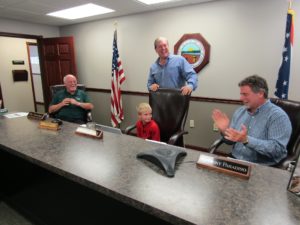 The year 2019 was a busy one for the Seneca County Board of Commissioners.
The year 2019 was a busy one for the Seneca County Board of Commissioners.
Some of the board’s major themes for the year included focusing on being fiscally responsible, welcoming new people, making capital purchases and infrastructure upgrades, renewing its commitment to economic development and continuing to promote transparency and accessibility.
In 2019, the commissioners decided to set funds aside for the future because of the ongoing positive financial situation.
The county’s General Fund revenue hit the second-highest mark since 2008 last year when it peaked at over $18 million.
One of the initiatives the board has undertaken is the establishment of the Budget Stabilization Fund. The fund, which is also known as the rainy-day fund, was created in April 2018.
Commissioner Mike Kerschner said that many taxpayers are concerned about the mounting national debt.
“People are concerned that we are borrowing from our children and grandchildren to pay for the things we are doing now,” he said. “At the county level, we believe it is important to recognize that the economy will not always be as robust as it has been the last couple of years.”
Kerschner said the commissioners believe it is paramount to put money away for the “rainy day” that will surely come.
“Instead of spending any excess we may have now, we are putting it away in a savings account,” said Kerschner. “If there are unforeseen circumstances or if the economy slows, this makes it so there is money available to fund operations without going to the citizens with a request to raise taxes.”
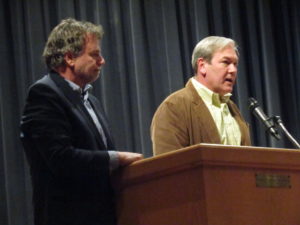 In 2019, the board increased the amount of money in the fund to $500,000 and at the beginning of 2020, the total was brought to $625,000.
In 2019, the board increased the amount of money in the fund to $500,000 and at the beginning of 2020, the total was brought to $625,000.
The board also continued its support of the county land bank in 2019, which helps clear blighted properties in the county.
In May, the commissioners sold the former Carnegie Library building, which also served as home to the Seneca County Juvenile and Probate Court. The 7,830-square-foot building was constructed in 1912 and operated as a library until 1976. The building sold for $90,000. This money is to be used to fund building maintenance and repairs.
The commissioners worked with Re/Max Unlimited Results Realty to auction off the building, which was purchased by local business owner Andrew Kalnow.
Commissioner Shayne Thomas said, “it was the right financial decision” to sell the building, which was no longer needed for operations.
“Turning it over to the private sector was the best long-term solution for the community,” he added.
Personnel changes
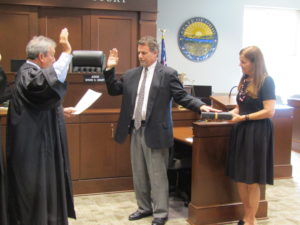 One of the board’s major themes last year was change – more specifically, the change of personnel. That theme started within the commissioners’ office itself when Commissioner Holly Stacy announced her resignation during a meeting on June 27.
One of the board’s major themes last year was change – more specifically, the change of personnel. That theme started within the commissioners’ office itself when Commissioner Holly Stacy announced her resignation during a meeting on June 27.
Stacy had served for about six-and-a-half years as a commissioner before moving on to another opportunity.
“It has been a privilege to serve the citizens of Seneca County as a commissioner,” she said in her resignation letter. “It’s been a learning experience, and an opportunity to be a public servant and make a positive difference in many things.”
Stacy’s last day was July 19, which paved the way for the board’s newest commissioner, Anthony Paradiso, to defeat five other candidates and be appointed by the Seneca County Republican Central Committee on July 29. Paradiso is to finish Stacy’s term, which runs through 2020.
Thomas thanked Stacy for her service.
“She was a conscientious public servant and thoughtful colleague,” he said. “She shouldered responsibility for many great county projects and events. One of my personal favorites was her inclusion of Vanguard-Sentinel students in the design and construction of the new board of elections office.”
Paradiso said his family and close friends urged him to seek the position.
“I am at a point in my life where I am backing off my business and looking to something else more along the lines of helping others,” he said.
Paradiso said his strengths include working with people, listening and getting many people to come together to work towards the same goals.
“As commissioners, you represent many people and different groups and entities. I wanted to help the county and give back some of my life experiences as a leader,” he said. “This is a full-time job and you need to be able to travel around the county, day and night, to cover many responsibilities.”
Personnel changes didn’t just occur at the commissioners’ office, but among other county offices as well. Former county treasurer Damon Alt, who served in the post for nine years, moved on to become magistrate for Seneca County Common Pleas Court Judge Michael Kelbley. The county’s Republican Central Committee chose Paul Harrison to replace Alt and finish his term, which expires Sept. 5, 2021.
The county hasn’t missed a beat.
“A positive working relationship between all elected officials best serves the taxpayers,” Thomas said. “Damon and Paul are both very easy to work with. Damon was instrumental in getting our Land Bank established and Paul has done a great job continuing the program.”
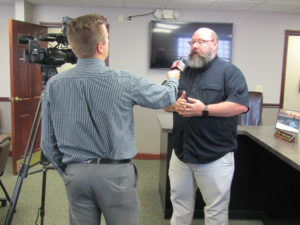 The Seneca County Emergency Services Department also experienced changes in 2019, as the county brought on John Spahr as Emergency Management Agency Administrator. Spahr has hit the ground running since being hired in March.
The Seneca County Emergency Services Department also experienced changes in 2019, as the county brought on John Spahr as Emergency Management Agency Administrator. Spahr has hit the ground running since being hired in March.
“John is a great fit,” Paradiso said. “He is detail and task-oriented, a Navy veteran, a good communicator and is very good technically. We are fortunate to have him as our EMA administrator.”
Several other personnel changes occurred throughout the county and within boards and committees the county serves on.
Capital purchases and infrastructure upgrades
 One other important theme of the current board is to prioritize building maintenance, capital purchases and infrastructure upgrades.
One other important theme of the current board is to prioritize building maintenance, capital purchases and infrastructure upgrades.
In the past few years when there is a request, the commissioners carefully consider if making a larger financial investment is the right decision because it will be a more reliable. Nine times out of 10, the board has chosen the more costly, but more efficient long-term fix.
This also is made easier by the foresight of setting aside cash for future projects.
Seneca County voters experienced new voting machines firsthand during the May and November elections last year. The total cost of the machines was more than $1 million with an additional annual fee for maintenance and upkeep.
The commissioners knew the state mandate was looming, so they decided to set aside $500,000. That funding coupled with about $650,000 in state money made the project easier to handle. The county purchased the machines in January.
Kerschner said this financial planning made the process much less of a headache than it could have been.
“Many counties did not put money away and had to fund the purchase out of operating budgets,” he said. “We had more than enough to purchase these machines and the Board of Elections team has done an outstanding job of installing and utilizing the new machines in every voting precinct.”
Another large project completed in 2019 was far less visible but just as impactful for county residents.
On May 22, county officials were joined by state leaders to “flip the switch” on a new fiber-ring project. The event was to celebrate the installation of a fiber ring that has helped to increase the county’s network capabilities. The project has improved and secured 9-1-1 emergency communications across the county, upgrading from dated T1 lines to a robust fiber system. The new has helped Seneca County take a step into the future, providing more reliable, faster and properly redundant connections between safety service personnel.
In March 2018, the commissioners signed a 20-year, $719,000 lease agreement with a local company, Bascom Communications, for the project.
The company was one of many community partners that contributed, including Buckeye IT and all the emergency services departments within the county.
“Servers, monitors, software and fiber work dutifully unseen,” Thomas said. “A climate-controlled server room with a generator back-up doesn’t glow like the lights on the tower, but it does illuminate the essential work of the county. With this investment, our county does look forward to the future, not just as an inclusive, forward-leaning community, but one that has cutting-edge technology.”
Other infrastructure improvements included a new roof at the Seneca County Opportunity Center, Seneca County Airport taxiway improvements, enhanced security at the Public Safety Building and design concept drawings for the Seneca County General Health District entrance renovation.
Renewed commitment to economic development services
 During 2019, the commissioners doubled down on their commitment to economic development. This included increased funds to both Tiffin-Seneca Economic Partnership and Fostoria Economic Development.
During 2019, the commissioners doubled down on their commitment to economic development. This included increased funds to both Tiffin-Seneca Economic Partnership and Fostoria Economic Development.
The board formalized contracts with both agencies and increased funding to $30,000 for FEDC and $89,000 for TSEP
Additional money for TSEP helped to support the hiring of Audrey Flood, whose focus is on rural economic development.
“Tiffin and Fostoria have had great successes, but we believe we also need to focus on the other 21 townships and villages in the county,” Kerschner said. “Audrey has visited and consulted with each of the villages and townships and has had success in implementing some plans and projects for many of them. We look forward to many rural projects in the future.”
Paradiso said he enjoys serving on the FEDC board.
“Fostoria and Seneca County have a great partnership,” he said. “Both sides see the benefit of working together. They have great leadership on their board, and everyone has a vested interest in Fostoria.”
 Paradiso credited FEDC President Renee Smith.
Paradiso credited FEDC President Renee Smith.
“She is an exceptional leader and her energy is contagious. More good things are ahead for Fostoria,” he said. “When Tiffin and Fostoria do well, so does Seneca County.”
Another unique venture undertaken by local leaders in 2019 was a trip to Japan. Kerschner joined Tiffin Mayor Aaron Montz, TSEP executive David Zak and State Rep. Bill Reineke on the trip.
“We attended the Midwest Economic Forum in Tokyo,” Kerschner said. “The purpose of the trip was to thank those Japanese companies who have come to Tiffin and Seneca County and created hundreds of jobs.”
Kerschner said the delegation met with executives of other Japanese companies who may have an interest in Seneca County in the future.
“The trip was very productive,” he said. “We will hopefully reap some benefits for the city and county.”
Transparency and accessibility
 In 2019, the commissioners continued improving transparency and accessibility for constituents.
In 2019, the commissioners continued improving transparency and accessibility for constituents.
The board increased accessibility by hosting meetings at different times and in various areas across the county. Off-site sessions were held at Tiffin University and in Bloom and Pleasant townships.
“Many citizens work and cannot make it to our typical meetings on Thursdays at 10 a.m.,” Paradiso said. “So, mixing it up a little allows us to give citizens an extra opportunity to attend a meeting.”
The board also launched its “Coffee with a Commissioner” meeting series. The less formal, one-on-one format was started in hopes of allowing casual conversation in a comfortable environment.
Paradiso said the program has several benefits.
“It’s great for us because we can meet more new people throughout the county,” he said. “I look forward to listening to constituents and hearing their ideas and concerns.”
Improvements to the internal and external communications of the office have also brought some statewide attention to the county.
Last year, Thomas presented at the County Commissioners Association of Ohio, updating peers on how the county has improved its communications, transparency and accessibility in the past few years.
“We have been recognized statewide for being forward-thinking on communication,” Thomas said. “Our positive messaging and focus on transparency have garnered attention. It’s satisfying to be acknowledged by our peers for leadership in this area.”
Not only have the aforementioned areas seen improvement, but the county also received news last year of a clean 2018 audit.
Cooperation and collaboration inside and outside of the county
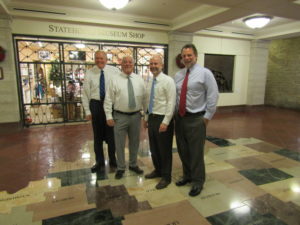 A theme that has been common in Seneca County dating back several years is one of cooperation and collaboration. This theme was demonstrated countless times again in 2019, not only inside Seneca County but across the state and the country.
A theme that has been common in Seneca County dating back several years is one of cooperation and collaboration. This theme was demonstrated countless times again in 2019, not only inside Seneca County but across the state and the country.
One example is the work done by many agencies in putting together state capital budget requests.
The county hired High Bridge Consulting to help push prioritized projects but work by many entities within the county was pivotal in putting together competitive pitches for funding.
Seneca Regional Planning Commission, Seneca County Opportunity Center, the Seneca County Park District and many others worked together to pitch projects to state legislators. The top two projects the county is seeking funding for are improvements to Opportunity Park and an upgrade to the entrance at the Seneca County General Health District.
“Both of these projects are transformational for our community,” Paradiso said.
The county also exhibited cooperation and collaboration by hosting visits from several state and federal representatives. The commissioners also spent time in Columbus networking with state officials. Commissioners spent time with Senator Rob Portman, Congressman Jim Jordan, State Supreme Court Justice Sharon Kennedy, State Auditor Keith Faber and state representatives Bill Reineke, Riordain McClain and Craig Riedel.
Planning
 “If you don’t know where you’re going, any road will get you there,” Kerschner said, regarding the importance of planning. “It is important to map out the future so we can incrementally make the right decisions to help us get to our destination. We have heard from hundreds of citizens about the direction they would like to see us take and we are listening.”
“If you don’t know where you’re going, any road will get you there,” Kerschner said, regarding the importance of planning. “It is important to map out the future so we can incrementally make the right decisions to help us get to our destination. We have heard from hundreds of citizens about the direction they would like to see us take and we are listening.”
Kerschner said work being completed on various plans will help the county continue to grow and prosper.
The county is currently in varying stages of several plans including a Facilities Master Plan, a countywide comprehensive plan and a countywide active transportation plan.
In early 2020, the county completed months’ worth of work when the board approved the county’s hazard mitigation plan, which will lead to eligibility for several pools of funding in case of a disaster.
“Kudos to John Spahr, our EMA Administrator, for completing this plan,” Paradiso said.
The board also paved the lane to the indigent cemetery on county property south of Tiffin.
“This grant-funded project is a critical leg in the long-term active transportation plan to traverse the county campus,” Thomas said.
Planning has also led to funding for several projects through the Community Development Block Grant program. Those projects included $9,400 for the Tiffin-Seneca United Way and Fostoria United Way for homelessness prevention and $43,100 for park improvements in Melmore.
“This is a program that targets projects that are off the radar and would not be possible without the support of these grants,” Paradiso said.
Individual achievements
 Several people in the county celebrated personal and professional milestones. Although we could not list them all in this section, here are a few of those accomplishments.
Several people in the county celebrated personal and professional milestones. Although we could not list them all in this section, here are a few of those accomplishments.
Seneca County Auditor Julie Adkins was named president of the County Auditors Association of Ohio.
Seneca County Emergency Services Director Ken Majors was recognized for achieving 30 consecutive years of National EMS Paramedic Certification.
“The more I’m around Ken, the more I appreciate him and realize how lucky the county is to have him,” Paradiso said. “He is very qualified technically; he is a registered nurse and is a former Army veteran, a medic and paratrooper. He worked at Life Flight both as a nurse and in management.”
Paradiso praised Majors’ leadership abilities with Seneca County EMS.
“Ken has balanced his budget, stretching the county’s money while maintaining first-rate EMS assets.”
Along with its director, the department also had some celebrating to do, as 2019 marked 40 years of service in the county.
“We are ever grateful for our volunteers, coordinators and professional staff for providing services when folks need it most,” Thomas said.
EMS volunteers Denny Hanlon and Jennifer Hill also were recognized for their ability as healthcare workers.
In April, the commissioners thanked all volunteers across the county for working to make the community a better place.
“The willingness of people to volunteer their time, talent and treasure to the county is very encouraging,” Kerschner said. “Many of the things we accomplish could not be done without people willing to step up and give their time. Within the county, we have volunteer firemen, EMTs court-appointed special advocates, health department board members, park district board members and volunteers, and the list goes on and on.”
One other individual who celebrated a milestone in 2019 was Theresa Roessner, who celebrated 30 years working in the Seneca County Clerk of Courts department in July.
“Her dedication to the job is amazing,” Kerschner said. “The many people she has touched over the years with her kindness and smile will be remembered for years to come.”
Seneca County Museum Director Tonia Hoffert also celebrated 20 years of involvement with the museum, while Ron Lutz, the county’s weights and measures inspector, and Brendan Cullen, the county’s GIS Programmer received recognition for their training and abilities.
Supporting people and institutions in our community
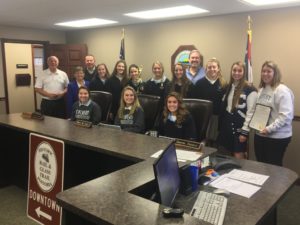 The last category of our year in review, but certainly not the least important, is about supporting the people and institutions of the community.
The last category of our year in review, but certainly not the least important, is about supporting the people and institutions of the community.
One of the ways the county has done is by illuminating the cupola lights on the Seneca County Justice Center to mark an occasion or accomplishment.
“Our pride in all things Seneca County is on visible display at the justice center,” Thomas said. “We are always ready to celebrate with our community and call attention to important events in the county.”
The commissioners have also approved many proclamations and sent letters to congratulate those who are doing great things in the county. This has also taken form by bringing attention to important initiatives and programs, including a campaign to raise awareness for suicide and mental health awareness
The commissioners were honored to take part in celebrations for the state champion Tiffin Calvert Girls’ volleyball team and the Clyde Fliers football team.
The board also highlighted women who are entrepreneurs in Seneca County through the Women in Business web series.
“There are so many successful entrepreneurs in Seneca County that are making business happen,” Thomas said. “It is important to showcase that our county is a great place for everyone to start, operate and own a business.”
Women who were featured this year include Kassandra Ringle, Dr. Robyn Vicek, Tracie Eakin and Christine Spencer and Brenda Engeman and Jessica Hasselbach.
While the commissioners enjoyed lending support and resources to positive movements within the county, the board also worked to give recognition to the loss of two outstanding community members who served as members on Tiffin City Council.
also worked to give recognition to the loss of two outstanding community members who served as members on Tiffin City Council.
The commissioners sent their condolences to the families of the late Mark Hayes and Jim Roberts after their passing last year.
The board also worked with several entities and local veterans to help host an event to remember Roberts.
“We lost a great patriot and a great man in Jim Roberts,” Kerschner said. “Jim was a county sheriff, a city of Tiffin councilman and a tremendous advocate for veterans. We were privileged to have Jim with us for more than 80 years and his memory will live on.”

